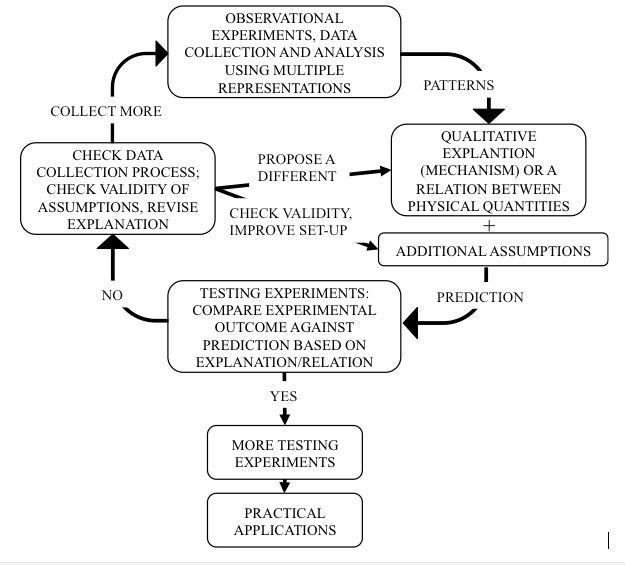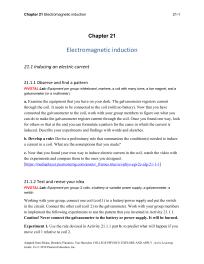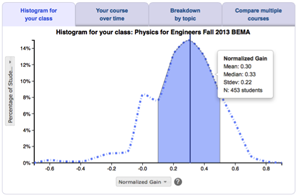
Developed by: Eugenia, Etkina, David Brookes, Gorazd Planinsic, and Alan Van Heuvelen








middle schoolhigh schoolintro collegeinter-mediateupper levelgrad school other

calc based

alg based

conceptual









Overview
What? Intentional holistic learning environment that helps students learn physics by engaging them in processes that mirror scientific practice and improves their well-being while they are learning physics. Builds on students' correct intuitions rather than eliciting and confronting their misconceptions.
Why? ISLE focuses on engaging students in scientific practices and building productive intuitions, rather than developing conceptual understanding and confronting difficulties. ISLE fits easily into a traditional structure of lectures, labs, and recitations, or into a studio or SCALE-UP classroom.
Why not? ISLE is very different from traditional or even other reformed physics instruction, so it may take some time for the instructor and the students to get used to it and to understand what they are supposed to be doing and to learn new ways of teaching and learning.
Activity outline

The Three Components of ISLE
- The first component is a cycle of logical reasoning that repeats for every new topic that is learned. The reasoning logic is a marriage of inductive and hypothetico-deductive reasoning:
Inductive: Observational experiments provide students with interesting data (and patterns) that need to be explained. Students generate multiple explanations based on prior knowledge and analogical reasoning.
Hypothetico-deductive: If this explanation is correct, and I do such and such (perform a testing experiment), then so and so should happen (prediction based on explanation). But it did not happen, therefore my idea is not correct (judgment). Or and it did happen therefore my idea has not been disproved yet (judgment). - The second component of ISLE is an array of representational tools that students learn to use to travel around the ISLE cycle and solve real-world problems (applications). These include: pictures, graphs, motion diagrams, force diagrams, impulse-momentum bar charts, work-energy bar charts, electric circuit diagrams, ray diagrams, wave front diagrams, etc.
- The third component of ISLE is the development of a set of scientific abilities or scientific habits of mind that allow students to travel around the ISLE cycle and solve real-world problems (applications) by thinking like a physicist. Here is an example of a scientific ability that students develop in ISLE: Students are able to identify assumptions they are making and how those assumptions affect a result. Notice that this ability applies in multiple contexts. Assumptions are made in designing a testing experiment and may affect the outcome of that experiment or the conclusions that are drawn from that experiment. Assumptions are made when applying physics knowledge to solve a real-world problem (e.g., figure out how far a projectile will travel). The assumptions made will affect the result of the calculation when compared with the actual outcome (i.e., firing the projectile and seeing how far it actually went). The full set of scientific abilities and the multiple contexts in which they occur are codified in the scientific abilities rubrics.
Student skills developed
- Conceptual understanding
- Problem-solving skills
- Lab skills
- Using multiple representations
- Designing experiments
- Metacognition
- Making real-world connections
Instructor effort required
- Medium
Resources required
- Projector
- Advanced lab equipment
- Cost for students
Resources
Everything you need to know about implementing ISLE in your class.
Book describing the approach: E. Etkina, D. Brookes, and G. Planinsic, Investigative Science Learning Environment: When learning physics mirrors doing physics, (2019).
More articles describing the ISLE approach:
- E. Etkina, Millikan award lecture: Students of physics—Listeners, observers, or collaborative participants in physics scientific practices?, Am. J. Phys. 83 (8), 669 (2015).
- E. Etkina and A. Van Heuvelen, Investigative Science Learning Environment - A Science Process Approach to Learning Physics, in Research-Based Reform of University Physics (2007), Vol. 1.
Textbook:
- E. Etkina, G. Planinsic, and A. Van Heuvelen, College Physics: Explore and Apply, (Pearson, New York, 2019): A textbook based on ISLE that will guide you through the ISLE process step-by-step, offer lots of real-life applications, examples of problem solving, and non-traditional problems. Includes a FREE instructor guide.
Free materials associated with the textbook:
Available on Mastering Physics platform. Ask your Pearson representative to create you a free account or email Eugenia Etkina at eugenia.etkina at gse.rutgers.edu
- E. Etkina, D. Brookes, G. Planinsic, and A. Van Heuvelen, Active Learning Guide (ALG), (Pearson, New York, 2019): A FREE set of activities and problems that can be used in lectures, recitations, labs, and homework for concept construction, testing and applications.
- E. Etkina, D. Brookes, G. Planinsic, and A. Van Heuvelen, Instructor Resource Materials, (Pearson, New York, 2019): A FREE instructor guide that lists general and content specific learning objectives for each chapter, describes common student difficulties, lists non-traditional problems, explains the logic of the material flow, the nuances of representations and language we use; it provides suggestions for instructors related to the sequence and implementation of the activities, student difficulties and cues the instructors on where the activities should be used.
Community: To become a part of the community of teachers implementing ISLE, join the Facebook group “Exploring and Applying Physics”. When you ask to join, do not forget to answer the question.
Teaching Materials
You can download many materials for teaching ISLE, including a complete ISLE Laboratory Program (for algebra- and calculus-based physics), a set of ISLE Video Experiments, and a set of higher-level thinking formative assessment activities and rubrics from the ISLE website.
ISLE activities are also available through the following textbooks:
- E. Etkina, G. Planinsic, and A. Van Heuvelen, College Physics: Explore and Apply, (Pearson, New York, 2019): A textbook based on ISLE that will guide you through the ISLE process step-by-step, offer lots of real-life applications, examples of problem solving, and non-traditional problems. Includes a FREE instructor guide.
- E. Etkina, D. Brookes, G. Planinsic, and A. Van Heuvelen, Active Learning Guide (ALG), (Pearson, New York, 2019): A FREE set of activities and problems that can be used in lectures, recitations, labs, and homework for concept construction, testing and applications.
- E. Etkina, D. Brookes, G. Planinsic, and A. Van Heuvelen, Instructor Resource Materials, (Pearson, New York, 2019): A FREE instructor guide that lists general and content specific learning objectives for each chapter, describes common student difficulties, lists non-traditional problems, explains the logic of the material flow, the nuances of representations and language we use; it provides suggestions for instructors related to the sequence and implementation of the activities, student difficulties and cues the instructors on where the activities should be used.
Here are sample activities on electromagnetic induction and circular motion.
Research
This is the highest level of research validation, corresponding to:
- both of the "based on" categories
- at least 4 of the "demonstrated to improve" categories
- at least 5 of the "studied using" categories
Research Validation Summary
Based on Research Into:
- theories of how students learn
- student ideas about specific topics
Demonstrated to Improve:
- conceptual understanding
- problem-solving skills
- lab skills
- beliefs and attitudes
- attendance
- retention of students
- success of underrepresented groups
- performance in subsequent classes
Studied using:
- cycle of research and redevelopment
- student interviews
- classroom observations
- analysis of written work
- research at multiple institutions
- research by multiple groups
- peer-reviewed publication
References
- K. Ansell and M. Selen, Student attitudes in a new hybrid design-based introductory physics laboratory, presented at the Physics Education Research Conference 2016, Sacramento, CA, 2016.
- D. Brookes and E. Etkina, Using conceptual metaphor and functional grammar to explore how language used in physics affects student learning, Phys. Rev. ST Phys. Educ. Res. 3 (1), 010105 (2007).
- D. Brookes and E. Etkina, "Force," ontology, and language, Phys. Rev. ST Phys. Educ. Res. 5 (1), 010110 (2009).
- D. Brookes and E. Etkina, Physical Phenomena in Real Time, Science 330 (10), 605 (2010).
- D. Brookes and E. Etkina, In search of alignment: Matching learning goals and class assessments, presented at the Physics Education Research Conference 2011, Omaha, Nebraska, 2011.
- D. Brookes and E. Etkina, The Importance of Language in Students' Reasoning About Heat in Thermodynamic Processes, Int. J. Sci. Educ. 37 (5-6), 759 (2015).
- D. Brookes, E. Etkina, and G. Planinsic, Implementing an epistemologically authentic approach to student-centered inquiry learning, Phys. Rev. Phys. Educ. Res. 16 (2), 020148 (2020).
- D. Brookes, B. Nainabasti, and Y. Yang, Characterizing Student Participation in an ISLE Physics Class, presented at the Physics Education Research Conference 2013, Portland, OR, 2013.
- D. T. Brookes, M. K. Wallace, M. Nelson, A. Karelina, P. Bohacek, M. Vonk, and E. Ektina, Comparing students’ learning and development of scientific abilities with apparatus-based versus video-based experimentation, Phys. Rev. Phys. Educ. Res. 19 (2) 020158 (2023).
- D. Buggé and E. Etkina, Reading between the lines: lab reports help high school students develop abilities to identify and evaluate assumptions, presented at the Physics Education Research Conference 2016, Sacramento, CA, 2016.
- D. Buggé and E. Etkina, The long-term effects of learning in an ISLE approach classroom, presented at the Physics Education Research Conference 2020, Virtual Conference, 2020.
- D. Buggé, J. Rutberg, S. H. Ahmed, R. Zisk, and D. Jammula, Development of hypothetico-deductive skills in an ISLE-based lab taught by novice instructors, Phys. Educ. 58 (3) 035013 (2023).
- M. Cancula, G. Planinšic, and E. Etkina, Analyzing patterns in experts' approaches to solving experimental problems, Am. J. Phys. 83 (4), 366 (2015).
- K. Commeford, E. Brewe, and A. Traxler, Characterizing active learning environments in physics using network analysis and classroom observations, Phys. Rev. Phys. Educ. Res. 17 (2), 020136 (2021).
- D. Demaree, Applying ISLE Ideas to Active Engagement in the Spins Paradigm, presented at the Physics Education Research Conference 2010, Portland, Oregon, 2010.
- D. Demaree and S. Li, Promoting productive communities of practice: An instructor’s perspective, presented at the Physics Education Research Conference 2009, Ann Arbor, Michigan, 2009.
- D. Demaree and Y. Lin, Assessing ISLE Labs as an Enhancement to Traditional Large-Lecture Courses at the Ohio State University, presented at the Physics Education Research Conference 2005, Salt Lake City, Utah, 2005.
- E. Etkina, Millikan award lecture: Students of physics—Listeners, observers, or collaborative participants in physics scientific practices?, Am. J. Phys. 83 (8), 669 (2015).
- E. Etkina, D. Brookes, and G. Planinsic, Investigative Science Learning Environment: When learning physics mirrors doing physics (2019).
- E. Etkina and A. Eisner, What did I learn and why do I believe in it?, presented at the Physics Education Research Conference 2003, Madison, WI, 2003.
- E. Etkina, M. Gentile, A. Karelina, M. Ruibal-Villasenor, and G. Suran, Searching for “Preparation for Future Learning” in Physics, presented at the Physics Education Research Conference 2009, Ann Arbor, Michigan, 2009.
- E. Etkina, A. Karelina, S. Murthy, and M. Ruibal-Villasenor, Using action research to improve learning and formative assessment to conduct research, Phys. Rev. ST Phys. Educ. Res. 5 (1), 010109 (2009).
- E. Etkina, A. Karelina, and M. Ruibal Villasenor, Studying Transfer Of Scientific Reasoning Abilities, presented at the Physics Education Research Conference 2006, Syracuse, New York, 2006.
- E. Etkina, A. Karelina, and M. Ruibal-Villasenor, How long does it take? A study of student acquisition of scientific abilities, Phys. Rev. ST Phys. Educ. Res. 4 (2), 020108 (2008).
- E. Etkina, A. Karelina, M. Ruibal-Villasenor, D. Rosengrant, R. Jordan, and C. Hmelo-Silver, Design and reflection help students develop scientific abilities: Learning in introductory physics laboratories, J. Learn. Sci. 19 (1), 54 (2010).
- E. Etkina and S. Murthy, Design labs: Students' expectations and reality, presented at the Physics Education Research Conference 2005, Salt Lake City, Utah, 2005.
- E. Etkina, S. Murthy, and X. Zou, Using introductory labs to engage students in experimental design, Am. J. Phys. 74 (11), 979 (2006).
- E. Etkina and G. Planinsic, Thinking like a scientist, Phys. World 27 (03), 48 (2015).
- E. Etkina and G. Planinsic, Defining and Developing “Critical Thinking” Through Devising and Testing Multiple Explanations of the Same Phenomenon, Phys. Teach. 53 (7), 432 (2015).
- E. Etkina and G. Planinsic, Investigative Science Learning Environment: A guide for teacher preparation and professional development (2024).
- E. Etkina and M. Ruibal Villasenor, Reformed Physics Instruction Through the Eyes of Students, presented at the Physics Education Research Conference 2006, Syracuse, New York, 2006.
- E. Etkina and A. Van Heuvelen, Investigative Science Learning Environment: Using the processes of science and cognitive strategies to learn physics, presented at the Physics Education Research Conference 2001, Rochester, New York, 2001.
- E. Etkina and A. Van Heuvelen, Investigative Science Learning Environment - A Science Process Approach to Learning Physics, in Research-Based Reform of University Physics, edited by E. Redish and P. Cooney, (American Association of Physics Teachers, College Park, 2007), Vol. 1.
- E. Etkina, A. Van Heuvelen, D. Brookes, and D. Mills, Role of Experiments in Physics Instruction - A Process Approach, Phys. Teach. 40 (9), 351 (2002).
- E. Etkina, A. Van Heuvelen, A. Karelina, M. Ruibal-Villasenor, and D. Rosengrant, Spending Time on Design: Does It Hurt Physics Learning?, presented at the Physics Education Research Conference 2007, Greensboro, NC, 2007.
- E. Etkina, A. Van Heuvelen, S. White Brahmia, D. Brookes, M. Gentile, S. Murthy, D. Rosengrant, and A. Warren, Scientific abilities and their assessment, Phys. Rev. ST Phys. Educ. Res. 2 (2), (2006).
- S. Faletic and G. Planinsic, How the introduction of self-assessment rubrics helped students and teachers in a project laboratory course, Phys. Rev. Phys. Educ. Res. 16 (2), 020136 (2020).
- B. Gregorcic, G. Planinšic, and E. Etkina, Doing science by waving hands: Talk, symbiotic gesture, and interaction with digital content as resources in student inquiry, Phys. Rev. Phys. Educ. Res. 13 (2), 020104 (2017).
- A. Karelina, Designing a lab course from the perspective of flow theory, presented at the Physics Education Research Conference 2015, College Park, MD, 2015.
- A. Karelina, E. Ektina, P. Bohacek, M. Vonk, M. Kagan, A. R. Warren, and D. T. Brookes, Comparing students’ flow states during apparatus-based versus video-based lab activities, Eur. J. Phys. 43 (4) 045701 (2022).
- A. Karelina and E. Etkina, When and How Do Students Engage in Sense-Making in a Physics Lab, presented at the Physics Education Research Conference 2006, Syracuse, New York, 2006.
- A. Karelina and E. Etkina, Acting like a physicist: Student approach study to experimental design, Phys. Rev. ST Phys. Educ. Res. 3 (2), 020106 (2007).
- A. Karelina, E. Etkina, M. Ruibal-Villasenor, D. Rosengrant, A. Van Heuvelen, and C. Hmelo-Silver, Design And Non-design Labs: Does Transfer Occur?, presented at the Physics Education Research Conference 2007, Greensboro, NC, 2007.
- S. Li, J. Roth, and D. Demaree, Survey Development for Assessing Learning Identity in an ISLE Classroom, presented at the Physics Education Research Conference 2010, Portland, Oregon, 2010.
- S. Murthy and E. Etkina, Development of Scientific Abilities in a Large Class, presented at the Physics Education Research Conference 2004, Sacramento, California, 2004.
- D. Rosengrant, A. Van Heuvelen, and E. Etkina, Do students use and understand free-body diagrams?, Phys. Rev. ST Phys. Educ. Res. 5 (1), 010108 (2009).
- M. Ruibal-Villasenor, E. Etkina, A. Karelina, D. Rosengrant, R. Jordan, and A. Van Heuvelen, From Physics to Biology: Helping Students Attain All-Terrain Knowledge, presented at the Physics Education Research Conference 2007, Greensboro, NC, 2007.
- J. Rutberg, M. Malysheva, and E. Etkina, Impact of ISLE-based labs in courses with traditional lecture, presented at the Physics Education Research Conference 2019, Provo, UT, 2019.
- K. Visnjic, C. Riihimaki, C. Sealfon, and E. Laffey, ISLE-inspired Design Laboratory Transformation at Princeton University: Year Two Results, presented at the Physics Education Research Conference 2015, College Park, MD, 2015.
- X. Zou, How students justify their knowledge in the Investigative Science Learning Environment, presented at the Physics Education Research Conference 2003, Madison, WI, 2003.





